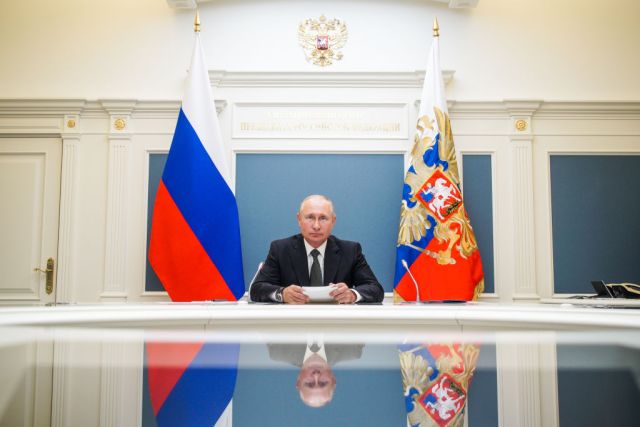Can Putin hang on to the edges of his nation? Credit: Alexei DruzhininTASS via Getty Images

The city of Khabarovsk lies close to Russia’s Chinese border, more than 6,000km and seven time zones to the east of Moscow. So far is it from the Russian capital that, until recently, what happened in Khabarovsk could have been expected too stay in Khabarovsk, especially if it was embarrassing to the Kremlin. These days, though, Russians are able to follow something that increases resembles a regional revolt live-streamed on social media.
Street protests in the city have just entered their third week, with tens of thousands gathering on Saturday for a march reported to be the biggest so far. Sparked by the removal of the regional governor, apparently on the Kremlin’s orders, the protests have grown into one of the most sustained regional challenges to the centre for many years. Placards and chants now combine support for the ousted governor, Sergei Furgal, with calls for Putin to resign: “Twenty years in power and we don’t trust you,” they say; “Russia without Putin”, “We are the power here!”
Small protests outside Moscow are not particularly unusual. What is unusual is that these have been so big and continued for so long. Still more unusual is that the local police have stood calmly by, doing nothing more disruptive than distributing anti-Covid masks and accepting the thanks of the marchers.
The demonstrations began on 11 July, two days after the governor’s arrest and summary transfer to a Moscow prison on charges of contract killings that date back more than 15 years. Initially, the protesters were simply demanding that he be freed or allowed to stand trial in Khabarovsk. Ten days later the protests gained new momentum, after Putin appointed a new interim governor, an MP from the Volga region, with no ties at all to the Far East.

Why Sergei Furgal was removed precisely when he was is not clear, but the political charge sheet against him could be long, and he has enemies, local and national. Back in 2018, he had dared to stand for the governorship of the Khabarovsk region against the Kremlin-approved incumbent. Worse, he had won by a landslide. Worst of all, he had then become popular, introducing changes – including televised government meetings, hot meals for schoolchildren, and auctioning off the previous administration’s yacht. Governors seen as competent who become popular in their own right are quite a rarity, so he would have been noticed.
It is possible that the Kremlin wanted to fire a warning shot across the bows of others hoping to emulate Khaborovsk’s brand of autonomy ahead of regional elections across Russia this autumn. The pro-Putin United Russia party fears that it could lose badly to the right-wing populist party — misleadingly called the Liberal Democrat Party. And, as it happens, this is the party that Furgal belongs to.
A more immediate reason could have been the relative lack of enthusiasm shown by Khabarovsk voters at the recent, 1 July, constitutional referendum. The referendum was held to approve amendments, including one that would, in theory, allow Putin another two presidential terms, but both the turn-out and the Yes vote in Khabarovsk were among the lowest in the land. The Governor had clearly fallen down on the job — hence, perhaps, the revival of old criminal charges against him.
The use of criminal allegations for a political purpose is, of course, a standard part of the Kremlin playbook — as it was in Soviet times. The Kremlin’s response to the unrest in Khabarovsk, however, has not entirely followed the script. So far, at least, it has resisted dispatching its own “heavies” to make up for the lack of local police action. And while the replacement governor — 39 year-old Mikhail Degtyaryov — is not a local, he belongs to the same populist party as the ousted governor, which was a concession reportedly made by Putin against his chief political aide’s advice, in the hope of drawing the sting of the protests.
There are other indications that the Kremlin may be trying a more calculated, psychological, approach than its usual swift resort to head-bashing. Attempts to dissuade protesters have included warnings of a local upsurge in Covid infections and of a pending terrorist attack (neither of which, it appeared, had any foundation or any effect). The Russian government then announced a new subsidy for the region, to coincide with the new appointee’s arrival (which did not stop him being booed).
Moscow also accepted, uncharacteristically, that the protests were home-grown. Asked whether there was orchestration from abroad or associates of the ousted governor, the official Kremlin spokesman, Dmitry Peskov told reporters: “No, we are not talking about that.” He went on to say that the priority was for the local authorities to ensure the smooth running of services and insisted that Putin had no plans to visit.
In all, this looks like a distinctly more hands-off approach to protests in the regions than Moscow has generally shown before. And this could make sense, because while the Khabarovsk protests are unusual, they are also part of an emerging pattern. In recent years, some of the most effective — and perhaps threatening — opposition to Vladimir Putin has taken place not at national level, but over corruption and environmental issues that are essentially local.
Take some of the protests that have made a national mark in recent years. In 2010, there was huge and at times violent opposition to government plans to route the new Moscow-St Petersburg highway through the Khimki forest outside Moscow. The then President, Dmitry Medvedev, eventually halted construction and the road was diverted away from the forest. There were also protests in the Far East over tariffs on imported second-hand Japanese cars.
In 2017, there were protests in more than 30 regions against the illegal dumping of waste. Opposition flared up again last year over plans for a vast new waste processing plant in pristine peatland three hours’ drive to the east of Moscow. The protests were routinely broken up by riot police, but this particular project was eventually abandoned, although other such facilities have gone ahead.
In spring last year the city of Yekaterinburg in the Urals was the scene of huge protests against plans by the Orthodox Church to build a cathedral on a city park. So fierce were the confrontations that Putin eventually took it upon himself to mediate and instructed the city to take a poll of local opinion. The result went decisively against the church hierarchy, which agreed to find another site.
In some ways, the anti-corruption campaigner, Aleksei Navalnyy, stole a march on the Kremlin more than a decade ago by anticipating the trend for local activism. Not only was he a pioneer of political mobilisation via the internet and social media, but he eschewed the capital to establish a network of local offices in friendlier places — including the old Siberian university city of Tomsk. These became hubs for collecting information on local complaints of corruption, which then fed into his national campaign. Over the years, the Kremlin has clipped Navalny’s wings, but the methods he adopted have influenced the conduct of Russian politics, and maybe that influence is now reaching the very top.
In his first two terms as President, 2000 to 2008, Putin had two priorities. One was to bring order to the financial chaos he had inherited from his predecessor, Boris Yeltsin. Salaries and pensions were not being paid; and inflation had devoured the earnings of professionals. The other was to keep the Russian Federation together. Scarred by memories of the Soviet collapse, there were widespread fears that Russia would be next. Preventing the break-up of Russia involved concessions to the largely Muslim republic of Tatarstan and is also what the two Chechen wars (1994-6 and 1999-2003) were all about.
Once Chechnya had been mercilessly bombed into semi-submission, Putin had to find a way of governing Russia’s vast expanse without the single-party structures of the Soviet era. His answer was to try to build what he called a “vertikal”, or pyramid, of power that would streamline administration nationally and develop levers that really worked.
Many commentators saw Putin’s “vertikal” as evidence of his autocratic, even dictatorial, ambitions. How effective it ever became, however, is questionable. After his four years as prime minister (2008 – 2012) and extensive travel around the regions, Putin lamented how difficult it still was to get the levers of power to work. In practice, many regions were often a law unto themselves. As the Russian proverb has it, “God is high above and the Tsar is far away”. With their chants of “We are the power here”, the Khabarovsk protesters clearly share some of that mentality.
More recently, however, and especially since his re-election in 2018, talk of Putin’s “vertikal of power” has been far less in evidence. Nor is it just in relation to the Khabarovsk protests that the Kremlin seems so far to be taking, or trying to take, a more cautious approach. From the start, Putin’s response to the Coronavirus pandemic has had much more in common with the approaches of more federally organised countries than is usual for Russia. Authority for deciding such matters as quarantine and lockdowns has been assigned to regional governors and city mayors, as has the building of “instant” hospitals.
Cynics might argue that Putin was deliberately taking a back seat, to avoid the blame if catastrophe ensued. In fact, though — while the figures can be contested — Russia has not done so badly by international comparisons. Its death rate per million of the population stands at 89, which is well down the global table — far below the UK (685), much of western Europe and the United States. There is another possible straw in the wind, too. While the headline from Russia’s constitutional referendum was about Putin being able to extend his presidency, other changes include greater authority for parliament, the Duma, vis a vis the executive, which could be interpreted as part of a wider move to devolve some power from the Kremlin.
The potential for much greater decentralisation is there. Russia has 85 regions headed by governors or an equivalent and the extent of their authority does not depend only on the Kremlin, it also depends on the state of the local economy, how dependent it is on largesse from the centre and on how much authority the governor can exert in relation to other powerful local interests. Observation and anecdote suggest that Russia’s second and third tier cities have become more prosperous in recent years, with families moving from Moscow to enjoy a better quality of life elsewhere. Greater regional confidence may be one factor underlying the defiance towards Moscow being shown in Khabarovsk. Others have suggested it is proximity to China and disappointment with the relatively slow pace of development on Russia’s side of the border.
It is quite possible that, if the Khabarovsk protests continue, the Kremlin will revert to its old ways. But if what is happening is the start of some re-thinking in Moscow about decentralisation, then these could be interesting times. Change direction too quickly, and there could be a real risk of dislocation, such as resulted from the destructive regionalism and protectionism that accompanied the Soviet Union’s collapse. On the other hand, if Putin were to give up on the “vertikal of power” and accept more give and take with the regions, that could just be the key to making Russia governable as a modern state — not just for what remains of Putin’s presidency, but beyond.










Join the discussion
Join like minded readers that support our journalism by becoming a paid subscriber
To join the discussion in the comments, become a paid subscriber.
Join like minded readers that support our journalism, read unlimited articles and enjoy other subscriber-only benefits.
Subscribe